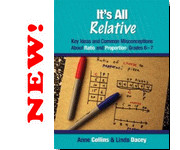Students use math, engineering to build campus pavilion Students at a school in Vermont recently used their math and engineering skills to design and build a pavilion on school grounds. The students used modern and traditional tools, including computer programs to design the structure and hammers and power tools to complete it. Head of school William Bugg said the hands-on project helped students "learn abstract things in the classroom and immediately apply (them) to what they are doing." Valley News (White River Junction, Vt.) (5/18) Boat launch puts middle-school students' math skills to the test About 20 math club students at a middle school in Alabama spent the last semester designing and building a boat. The students recently took their new boat out on a local lake with several of their teachers and mentors. "They really learned about how to apply math skills to real-world situations," said sixth-grade teacher Melinda Williams. AL.com (Alabama) (5/16) Other News  | 100% aligned to CCSS — Utilize the 8 mathematical practices Walch Integrated Math's CCSS Integrated Pathway Math I, II, and III programs are available with SBAC or PARCC item types and equip teachers with high quality, flexible resources for all types of learners. From the leader in CCSS #IntegratedMath, with over 100,000 students already in Walch Integrated Math classrooms. Free samples and information. | | | | | How online games can influence motivational intelligence Modern educational games use simulation and experiential learning to help boost student motivation, writes Jordan Shapiro, a game-based learning expert. Such games can offer social, emotional and metacognitive benefits, he notes. "Contrary to the popular image of the gamer as an awkward, socially inept loner, players are actually engaged with one another," he writes. "Gamers play cooperatively. They play competitively. They share tips and tricks. They work together. The teach each other how to get better at the game." KQED.org/Mind/Shift blog (5/16) Other News |  |
All middle-grades math teachers should have It's All Relative at their fingertips during planning and instruction. This handy 98-page flipchart is designed to engage students and develop deep conceptual understandings while correcting common misconceptions. 30 modules focus on key standards with instructional strategies, activities, and reproducibles. Download 3 free lessons! |
|
 | Ariz. school district works through common core challenges The transition to the Common Core State Standards for schools in Arizona's Maricopa Unified School District has been challenging, but rewarding, say district educators. This article outlines how teachers have introduced close reading of topics in language classes and real-world examples to teach math. "[Common core] is a challenge in that it changes how we are teaching," said Heidi Vratil, the district's professional development coordinator. "It's not easy, but our teachers have lived up to the challenge and have done great work." InMaricopa (Ariz.) (5/17) | Ill. kindergartners learn STEM concepts through puppet show A Washington, D.C.-based performance group is teaching young students science, technology, engineering and math concepts through the arts. With funding from federal grants, the Wolf Trap Institute for Early Learning Through the Arts recently sent teacher-artist Jeanne Wall to an Illinois elementary school to lead lessons with kindergartners, and demonstrate for their teachers how to teach abstract concepts through a puppet show. Daily Herald (Arlington Heights, Ill.) (5/15) A Washington, D.C.-based performance group is teaching young students science, technology, engineering and math concepts through the arts. With funding from federal grants, the Wolf Trap Institute for Early Learning Through the Arts recently sent teacher-artist Jeanne Wall to an Illinois elementary school to lead lessons with kindergartners, and demonstrate for their teachers how to teach abstract concepts through a puppet show. Daily Herald (Arlington Heights, Ill.) (5/15)
| Bill to delay teacher evaluations passed by Mich. senate Members of the Michigan State Senate have voted unanimously to delay teacher evaluations to the 2015-16 school year as lawmakers and state education officials choose a test. The state education department plans to use the Common Core State Standards tests developed by the Smarter Balanced Assessment Consortium, but some lawmakers want the state to revise the existing Michigan Education Assessment Program. "All this bill does is give us time to pick an assessment test," said state Sen. John Pappageorge, R-Troy. The Detroit News/The Associated Press (5/14) |  | What we think, or what we know, or what we believe is, in the end, of little consequence. The only consequence is what we do." -- John Ruskin, British art critic, writer and philanthropist | | | | Math Education SmartBrief is an aggregation of published news and editorial content from diverse sources. The content of Math Education SmartBrief does not necessarily reflect the position or editorial viewpoint of any particular organization. | Please contact one of our specialists for advertising opportunities, editorial inquiries, job placements, or any other questions.
| Mailing Address:
SmartBrief, Inc.®, 555 11th ST NW, Suite 600, Washington, DC 20004 | | |


No comments:
Post a Comment